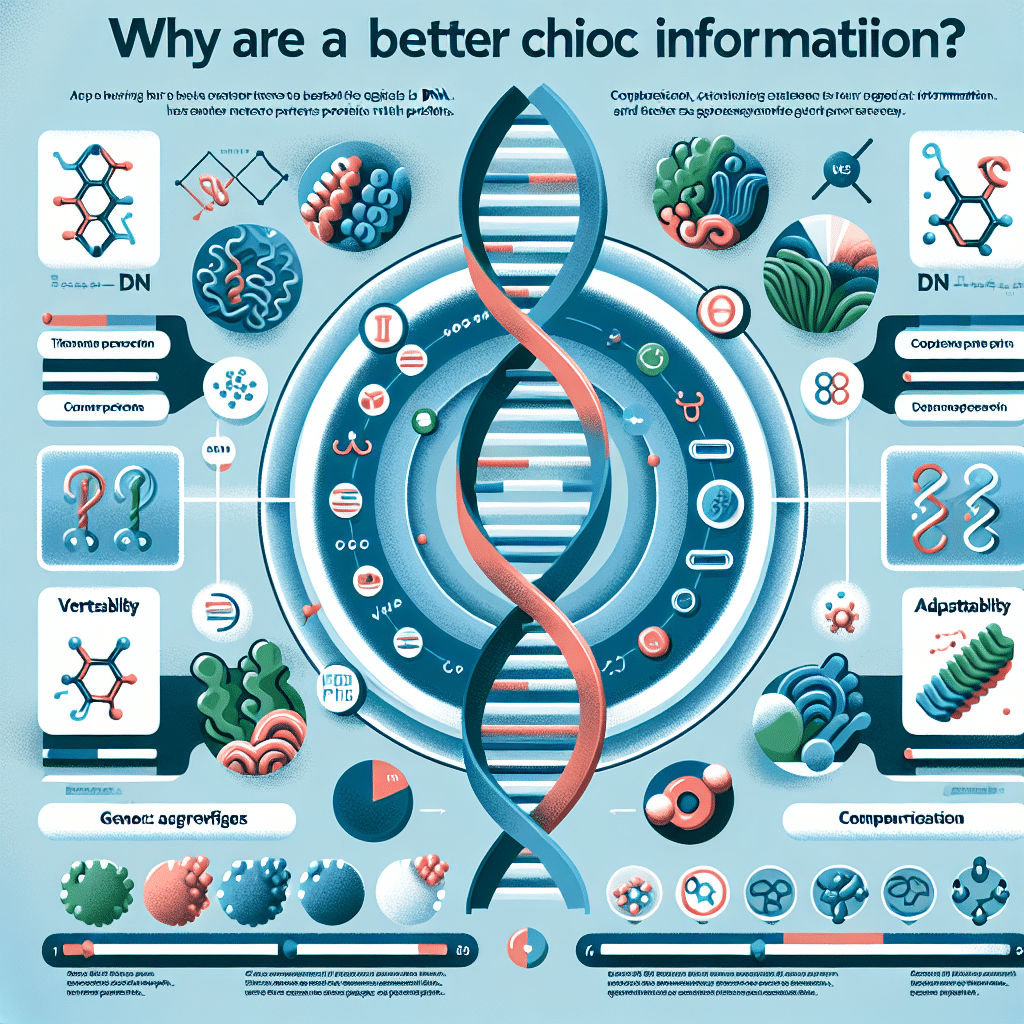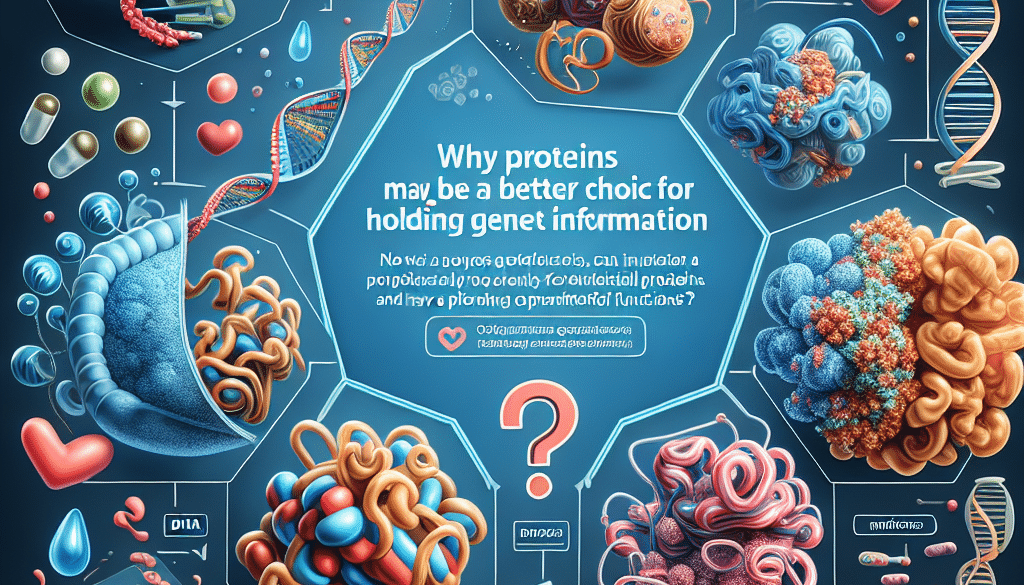Why Proteins: The Better Choice for Genetic Information?
-
Table of Contents
- Proteins: The Superior Choice for Genetic Information Storage
- The Current Understanding: DNA and RNA
- The Hypothetical Advantages of Protein-Based Genetic Systems
- Complexity and Diversity
- Functional Directness
- Stability and Error Correction
- Evolutionary Potential
- Challenges and Limitations
- Replication Fidelity
- Historical Precedence
- Technological Barriers
- Case Studies and Theoretical Models
- Conclusion: A Thought-Provoking Possibility
- Discover ETprotein’s High-Quality Protein Products
Proteins: The Superior Choice for Genetic Information Storage

When it comes to the storage of genetic information, the role of proteins is often overshadowed by the more famous nucleic acids, DNA and RNA. However, the concept of proteins as a potential medium for genetic information is a fascinating area of theoretical exploration. This article delves into the reasons why proteins could be considered a better choice for genetic information storage, despite the current biological paradigm favoring nucleic acids.
The Current Understanding: DNA and RNA
Before we explore the potential of proteins, it’s important to understand the current biological consensus. DNA (deoxyribonucleic acid) and RNA (ribonucleic acid) are the primary molecules responsible for storing and transmitting genetic information. DNA’s double-helix structure and the four-letter code of nucleotides (adenine, thymine, cytosine, and guanine) provide a stable and efficient means of encoding the instructions for life. RNA plays a crucial role in translating this code into proteins, which perform a myriad of functions within living organisms.
The Hypothetical Advantages of Protein-Based Genetic Systems
Despite the effectiveness of nucleic acids, proteins have unique properties that could, in theory, make them a superior medium for genetic information. Here are some compelling reasons:
Complexity and Diversity
- Proteins are made up of 20 different amino acids, compared to the four nucleotides of DNA and RNA. This increased variety could potentially allow for a denser storage of information.
- The three-dimensional structures of proteins provide an additional layer of complexity, which could be harnessed for information storage and retrieval.
Functional Directness
- Proteins are the workhorses of the cell, directly responsible for structure, function, and regulation. A protein-based genetic system could streamline the flow of genetic information to functional output.
- By skipping the transcription and translation processes, a protein-based system might reduce the time and energy needed for gene expression.
Stability and Error Correction
- Proteins can be incredibly stable, with some able to withstand extreme temperatures and pH levels. This stability could be advantageous for the long-term storage of genetic information.
- Proteins have the potential for self-replication and error correction, as seen in prions. While prions are often associated with disease, they demonstrate that proteins can transmit information.
Evolutionary Potential
- The vast combinatorial possibilities of amino acids could allow for a more nuanced evolutionary process, with a greater potential for variability and complexity.
- Protein-based systems might evolve new functions more readily, as changes at the protein level could directly influence cellular behavior without the need for intermediate steps.
Challenges and Limitations
While the idea of protein-based genetic information is intriguing, there are significant challenges that would need to be overcome:
Replication Fidelity
- Proteins lack a straightforward mechanism for self-replication with high fidelity, which is essential for the transfer of genetic information across generations.
- The complexity of protein structures makes accurate copying a daunting task, potentially leading to high error rates.
Historical Precedence
- The “RNA world” hypothesis suggests that RNA was the original molecule for genetic information, with DNA and proteins evolving later. This evolutionary path indicates that nucleic acids have inherent advantages in information storage.
- There is no known natural system where proteins serve as the primary genetic material, suggesting that if protein-based systems were advantageous, they might have evolved already.
Technological Barriers
- Current biotechnology is heavily centered around DNA and RNA manipulation. Developing tools for protein-based genetic systems would require a significant paradigm shift.
- Protein synthesis and folding are complex processes that are not yet fully understood, making the artificial creation of a protein-based genetic system a monumental task.
Case Studies and Theoretical Models
While no natural protein-based genetic systems are known, scientists have created theoretical models and synthetic systems to explore this possibility:
- Researchers have designed synthetic polymers that mimic some properties of proteins, aiming to understand how a protein-based genetic system might operate.
- Studies on prions have provided insights into how proteins can encode and transmit information, albeit in a limited and often harmful way.
Conclusion: A Thought-Provoking Possibility
The idea of proteins as a better choice for genetic information storage is a thought-provoking concept that challenges our understanding of life’s molecular foundations. While the current biological paradigm is firmly rooted in the roles of DNA and RNA, the theoretical advantages of proteins offer a fascinating glimpse into alternative genetic systems. The complexity, direct functionality, and evolutionary potential of proteins make them an intriguing subject for further research, even if practical applications remain distant.
Discover ETprotein’s High-Quality Protein Products
If you’re interested in the practical applications of proteins, ETprotein offers a range of high-quality protein products suitable for various industries. Their organic and non-GMO plant proteins, such as rice protein, pea protein, and seed proteins, are perfect for nutraceuticals, pharmaceuticals, and food and beverage applications. With a commitment to quality and customer satisfaction, ETprotein is your go-to source for all your protein needs.
About ETprotein:
ETprotein, a reputable plant protein vegan protein Chinese factory manufacturer and supplier, is renowned for producing, stocking, exporting, and delivering the highest quality organic bulk vegan protein and plant proteins. They include Organic rice protein, clear rice protein, pea protein, clear pea protein, watermelon seed protein, pumpkin seed protein, sunflower seed protein, mung bean protein, peanut protein etc. Their offerings, characterized by a neutral taste, non-GMO, allergen-free attributes, cater to a diverse range of industries. They serve nutraceutical, pharmaceutical, cosmeceutical, veterinary, as well as food and beverage finished product distributors, traders, and manufacturers across Europe, USA, Canada, Australia, Thailand, Japan, Korea, Brazil, and Chile, among others.
ETprotein specialization includes exporting and delivering tailor-made protein powder and finished nutritional supplements. Their extensive product range covers sectors like Food and Beverage, Sports Nutrition, Weight Management, Dietary Supplements, Health and Wellness Products, and Infant Formula, ensuring comprehensive solutions to meet all your protein needs.
As a trusted company by leading global food and beverage brands and Fortune 500 companies, ETprotein reinforces China’s reputation in the global arena. For more information or to sample their products, please contact them and email sales(at)ETprotein.com today.












